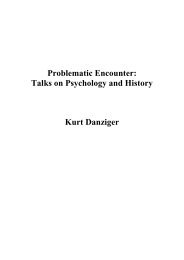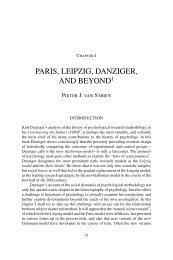The positivist repudiation of Wundt - Kurt Danziger
The positivist repudiation of Wundt - Kurt Danziger
The positivist repudiation of Wundt - Kurt Danziger
Create successful ePaper yourself
Turn your PDF publications into a flip-book with our unique Google optimized e-Paper software.
218 KURT DANZIGER<br />
will only for the sake <strong>of</strong> brevity.”s1 This Machian tour deforce was to set the tone for<br />
Titchener’s later “interpretations” <strong>of</strong> <strong>Wundt</strong>. By the time Titchener’s Textbook<br />
appeared, apperception hardly merits a mention and is quickly dismissed with the<br />
sentence: “It is a question, however, whether there is any real gain in the introduction <strong>of</strong><br />
the term.” 52 Indeed, if we are to limit ourselves to “observed interaction” without<br />
reference to the underlying dynamics, then the term does become pointless and might as<br />
well be replaced by “attention.” It is noteworthy that Titchener’s lectures on that subject<br />
treat the topic in terms <strong>of</strong> elementary feelings and sensations, completely ignoring the<br />
fact that for <strong>Wundt</strong> the key to the whole area lay in the concept <strong>of</strong> psychic causality,<br />
specifically the principles <strong>of</strong> psychic resultants and psychic relations. With the abandon-<br />
ment <strong>of</strong> such concepts, which appear “metaphysical” from the point <strong>of</strong> view <strong>of</strong> a<br />
Machian philosophy <strong>of</strong> science, the problem <strong>of</strong> attention must indeed reduce to a ques-<br />
tion <strong>of</strong> sensory and affective elements.<br />
Feeling<br />
<strong>The</strong> question <strong>of</strong> elements also became crucial in the area in which Titchener’s usual<br />
strategy <strong>of</strong> quiet “reinterpretation” <strong>of</strong> <strong>Wundt</strong> would not work, the psychology <strong>of</strong> feeling.<br />
That Titchener argued at length against <strong>Wundt</strong>’s tridimensional theory <strong>of</strong> feeling is well<br />
known. What was behind this controversy? <strong>The</strong> empirical evidence was, as usual,<br />
equivocal and could be interpreted to favor various points <strong>of</strong> view. It depended on which<br />
lines <strong>of</strong> evidence one chose to trust and which pattern <strong>of</strong> explanation one preferred; and<br />
these choices and preferences were in turn determined by one’s commitment to one or<br />
other philosophy <strong>of</strong> science. On the methodological side the difference between <strong>Wundt</strong><br />
and Titchener followed a direction that was highly characteristic <strong>of</strong> their approach to<br />
psychological investigation in general. Two lines <strong>of</strong> evidence existed in the area <strong>of</strong><br />
feeling: introspective evidence, and evidence from the analysis <strong>of</strong> patterns <strong>of</strong><br />
physiological activity accompanying feeling. <strong>Wundt</strong>’s tridimensional theory had been<br />
developed in the light <strong>of</strong> the psychophysiological studies <strong>of</strong> Lehmann, Mentz, and<br />
Kie~ow.~~ Titchener, on the other hand, dismissed this kind <strong>of</strong> evidence as irrelevant to<br />
the psychology <strong>of</strong> feeling and preferred to rely entirely on introspective e~idence.~‘ His<br />
original paper on the subject 55 was severely criticized by <strong>Wundt</strong> 56 as constituting a<br />
flagrant misuse <strong>of</strong> the introspective method,57 a regression to the prescientific kind <strong>of</strong> introspection<br />
whose products are simply the result <strong>of</strong> suggestion and <strong>of</strong> preestablished<br />
opinions. <strong>Wundt</strong> remained skeptical in the face <strong>of</strong> Titchener’s more systematic use <strong>of</strong> introspection<br />
in this area, regarding the data as worthless because <strong>of</strong> the overwhelming<br />
effect <strong>of</strong> either the experimenter’s or the subject’s preexisting prejudices and beliefs.<br />
<strong>Wundt</strong> took essentially the same stand in regard to the investigation <strong>of</strong> complex<br />
feelings (and almost all feelings are complex) as he was to take in regard to the investigation<br />
<strong>of</strong> complex cognitive processes by the WUrzburg School a few years later. <strong>The</strong> experimental<br />
method comes up against its limits in the face <strong>of</strong> these complex processes, and<br />
introspection is worse than useless when it attempts to analyze such complexes into what<br />
are supposed to be their elements: “As it is quite impossible to separate the ideational<br />
and feeling components <strong>of</strong> any complex experience by means <strong>of</strong> mere introspection it is<br />
hardly possible that anything else should emerge from this method but what one already<br />
knows or believes one knows.” 58 Up to a point, one can try to deal with this problem by<br />
using physiological observations to provide an objective anchor for the introspective<br />
reports, but this will only work in “comparatively simple cases.” <strong>The</strong>re is a special<br />
problem in the area <strong>of</strong> feeling because <strong>of</strong> the difficulty <strong>of</strong> giving an adequate account <strong>of</strong><br />
feelings through the verbal medium. <strong>Wundt</strong> considered music to be a “pure language <strong>of</strong>





